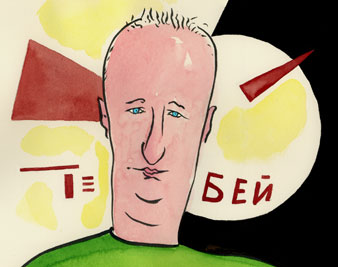 Adrian Bellesguard
Adrian Bellesguard
Billy Bragg is a living legend of the British punk and folk music scenes who writes about politics and romance with equal passion. He’s also an activist for progressive causes, known on both sides of the Atlantic. This spring he released his twelfth studio album, Mr. Love & Justice (Anti-Records).
You recently published an op-ed in the New York Times about musicians’ rights on social networking sites like Bebo.
I wrote the op-ed about Bebo to highlight the question of how people who contribute content to Internet sites should be rewarded for their contribution. [The companies are] building their business on free content and yet when they monetize that free content, they walk away with close to $650 million from the sale. It does raise the question of whether those contributions should have been rewarded, because it is the content that creates those communities, rather than the host.
What’s the best way to monetize that contribution?
The way that the music industry has done it so far is to go after the users. I prefer a different model. Users don’t pay for radio. But that doesn’t mean it’s not being paid for. The business is paying because it uses the songs to attract advertising, and it pays some of the advertising revenue to the content providers. Rather than trying to criminalize their audiences, we should be looking at the business models that use music to attract advertisers and build community. People have said that websites give people free publicity. But I don’t see how that’s different than radio. Radio still pays a royalty. It’s music and the ability to hear and exchange music that’s driving a lot of the technology. Everyone says that music has value–I think they question whether it has a price. The users have found that it’s very easy to get music, and unfortunately business has decided that music doesn’t have a price anymore.
Do kids today expect everything to be free?
It isn’t a different impulse than me taping John Peel’s radio show in the evening. I couldn’t listen to that entire show. I didn’t like everything I heard. Half of it was horrible to my late-teen ears. But that’s where I first heard the Sex Pistols. Now, we all know radio’s become a lot less diverse since then. So the Interent offers the potential for hearing other things that you wouldn’t necessarily hear. I would be a fool if I came out against that. I really don’t want to criminalize that process. The people walking away with the big bucks are not the kid who’s downloading, filling his iPod with free music. It makes a lot more sense for us to be talking to the multinational conglomerates.
Popular
"swipe left below to view more authors"Swipe →
So downloading is no different than making a tape?
I don’t think so. The songs that they have on their iPods, are they not a reflection of their personality the way we used to buy new music to look cool? We’re hopefully imbibing them with a love of music. Christ knows there’s more competition now than there ever was for people to love music. By constantly wagging a finger at them, telling them they’re doing something illegal–well, since the 1980s more has become illegal. Back in the old days of vinyl the British music industry used to print on the inner bag of albums a logo, a cassette with crossbones underneath it, that said, Home Taping Is Killing Music. How ridiculous is that? Capitalism is killing music, and I went so far as to print that on the cover of Workers Playtime (1988). The industry has long tried to blame the consumer for its own shortcomings. My concern is that a new generation will come along who won’t be able to do what I do, which is make a decent living doing what they love doing. If we don’t protect individuality and the possibility of individuality, all the music will originate in the corporations. We’ll get Hannah Montana forever. A band like Radiohead or Björk or Sigur Rós will never get out there. That’s ultimately what’s at stake, the music to come. It behooves us older artists to make that point and make a stand. We have a voice and a platform. Nobody’s speaking for the kid who’s about to click on “Yes, I agree to the terms and conditions” of the website.
Tell me about the new album, Mr. Love & Justice.
Since the last album, around 2002, I’ve come to view politics in broader terms. Obviously we live in a post-Marxist, post-ideological period, so we have to rethink how we articulate the things we believe in. That process has led me to talk to my audience not about the evils of capitalism and conservatism and racism, but to focus on what I see as the thing they have in common, which is cynicism. The worst aspects of capitalism, the worst impulses of conservatives and every inch of racism is driven by cynicism. And our problem, for those of us who want to make a better world, is that we’re prone to that as well. I helped to get Tony Blair elected, so you can imagine how I feel sometimes. But I also remain committed to the process.
What’s it like to be rocking past 50?
I still have that same energy, that same excitement. I don’t have any urge to look back at what we did in the twentieth century and say, I wish it was like that. I’m still excited to take part in things. The reaction from the New York Times piece has been great fun. I’ve been on a couple of blogs and they ripped me up, and I chucked stuff back at them and they called me names. It’s been great fun.


